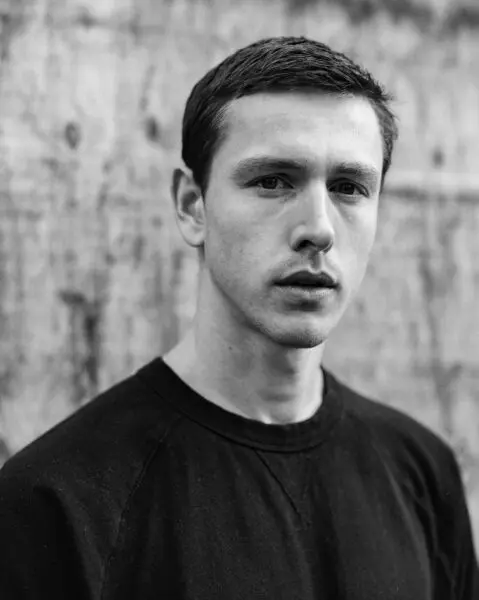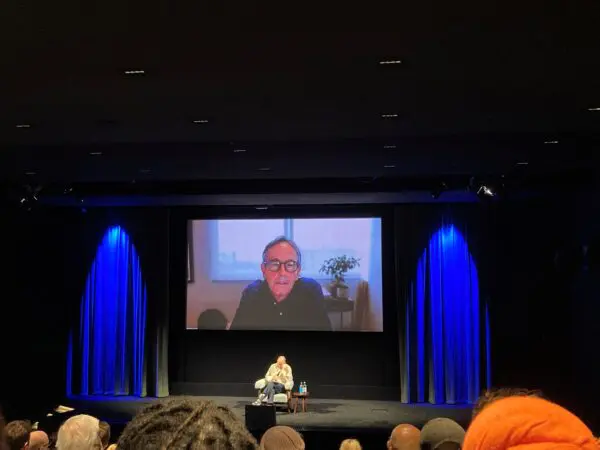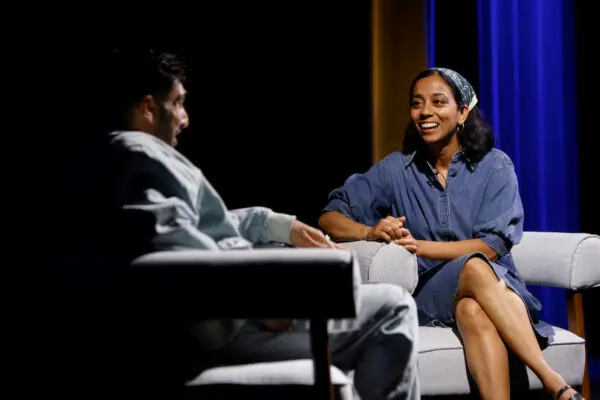What’s your earliest memory of cinema/film?
First, The Wizard of Oz (1939). I must have seen it at least 50 times. Secondly, Don’t Look Now (1973), which I saw at eight years old, I wasn’t supposed to be watching it but it indelibly seared into my mind. I think Nic Roeg is one of the best directors in the world. Both are so transportive, especially The Wizard of Oz. They take you into different worlds… I was one of those kids who, when watching a film, if anyone asked me a question I just couldn’t answer. My mum would be going, “Lynne!” and I just wouldn’t answer because I was so immersed in it.
My daughter loves The Wizard of Oz as well, she saw it when she was three. It is quite scary, but I think kids like films that are a bit scary. If a film is really good and immediately you’re inside them, you just don’t think about the outside world. Those are the films that last the test of time.
I had a very happy childhood, so it wasn’t like I had a grey life and these were transporting me elsewhere. I think you get to an age when you’re very imaginative [and] The Wizard of Oz has a lot of different things in it that are very appealing to a child. The world is not as you think it is, you know? It’s this crazy adventure, and there’s a kind of menace in it that’s exciting as a child. Even to this day, I watch The Wizard of Oz like I did when I was five years old. I get really involved in it. Especially when you see it with someone else who’s watching it for the first time, you see how mesmerised they are by it.
How did your journey start? Why did you want to be a director?
I didn’t. I fell into it inadvertently through being a stills photographer. Being a film director wasn’t a career option where I came from, a typical working-class Glaswegian family. My parents were film buffs, so from an early age, I was exposed to their passion for old Hollywood classics. I was brought up watching Mildred Pierce (1945), Bette Davis, Alfred Hitchcock. We would talk about the plot while we watched them.
I discovered photography because I was at this little place in Glasgow, I think it was the Visual Arts Centre, and there was a huge darkroom that no-one was using. I didn’t know anything about photography, but I thought it was amazing, the smell of the chemicals and everything. I was self-taught, I thought it was like magic, an alchemy, things appearing before you in the developer. I became quite obsessed with it.
A great photography teacher showed our class Meshes in the Afternoon (1943) by Maya Deren, with and without the soundtrack. I was mesmerised by it. I applied to film school on a whim the day before the deadline expired. On the back of my stills work, I got an interview with the NFTS. I had no clue about film and in my test I was asked to shoot a woman sat by a firelight while a storm rages outside. I did a big close-up on an eye, like a Man Ray. I didn’t understand the aspect ratio would crop it and make it even closer. It looked pretty striking on the big screen and I guess they liked it.
So, I went to film school not knowing anything about film, having never made one. It was Walter Lassally, a great DP, he really liked me – I think he thought he could see an eye there… I hadn’t done a foundation year or anything. Most people there had made films before, I think I was probably alone in never having made one. So, I was discovering what films were and learning how to move the camera and everything. It was a different language, but I learned pretty fast.
Why direction? A love of photography would suggest a career in cinematography was beckoning, right?
I think a lot of directors come from a photography background. For me, photography was about documenting things, so it was more like being a film director. I think filmmaking is about the relationship of vision, sound and music… What I was doing [as a photographer] felt closer to a director or documentarian, than cinematography, even though I appreciated the technical aspects, because you need to know that stuff. It just felt closer to me.
As a photographer, you’re constantly looking at people, their eyes, hands, how they walk, their mannerisms, and that’s great for characterisation. Also, in framing, by what you omit and what you include, you can say something about the scene through tiny details. In Ratcatcher, for instance, James’s mother has a hole in the toe of her stockings that she’s always darning – she can’t afford new ones. Later in the film, just before James leaves home, never to return, he watches her while she’s sleeping and tries to pull the hole out of sight so she’s perfect again. It was an expression of his love for her boiled down to one gesture. I loved the economy of finding that emotion in something seemingly so mundane.
So, noticing and looking at things like a photographer, even when on set and everything seems already worked out, really helps me as a filmmaker.
Where did the writing side come from?
I wrote short stories before I wrote any film scripts. My short films were short stories; I wrote them as short stories. It just happened to be that at the same time that I was writing these short stories I was at film school, so I thought maybe I could turn them into little movies.
There was no big plan [to write]. There were a lot of short films at film school that were like industry calling cards – here’s the twist in the tale, you know – and I don’t think I was ever really interested in that. I was more interested in how you touch people. I think my short stories had things in them that people recognised – tiny moments, even the most banal things, but recognisable. For me, that’s when film works really well: you don’t know why, but you recognise something you felt or something seems familiar. It touches you and makes you feel something.
Which of your crafts do you enjoy the most?
Probably sound. It works on your subconscious brain in strange ways, like music. You can’t really put your finger on it, it’s tribal and I love that. I studied images so that’s familiar to me. I think in shots.
The other is editing, with big thanks to Lucia Zuchetti and Joe Bini, who taught me a lot.
When did you think, ‘OK, this is going to work out’?
No big moment really. I guess I don’t think like that. Or it doesn’t quite work like that. The financiers of Ratcatcher were BBC Scotland and Pathé. An amazing young woman in development at BBC Scotland, Ruth McCance, gave me a chance after seeing my shorts. She asked me to write a treatment for a feature. To be honest, I had no idea what a treatment entailed and handed in 50 or 60 pages, almost a feature-length script. It was a mess of ideas but it had something authentic that she recognised.
I remember a screening of the film for Pathé and the main financier was French. I was very nervous and I don’t think he understood a word of the film – most of the children were street cast in Glasgow. Charles McDonald, one of the publicists on the film, who I’ve worked with ever since, was the first person to approach me after the screening. He was so genuinely moved and surprised by the film. It felt like we had made something special.
I had only made three shorts before Ratcatcher, most of which were almost silent. It was overwhelming making a feature. All of my team were first-time filmmakers, my compadres from film school: Alwin Küchler was the DP; Lucia Zucchetti, the editor; and Jane Morton, the production designer. I remember Mike Leigh loved the film. That was a great moment for me when he introduced a screening saying he had watched the film twice.
How did you feel when you saw Ratcatcher up on the big screen for the first time with an audience?
It’s always nerve-wracking seeing a film with an audience for the first time, as you definitely feel the atmosphere, but it’s also exhilarating if they seem to be going with it.
What have been the biggest barriers you’ve had to overcome to date?
Being short. Having a Glaswegian accent. Avoid mirrors while shooting.
What have been the highlights – the positive, enjoyable bits?
I prefer when I’m in the process, that’s the most exciting part. Press tours can be long, lonely and not very creative.
How do you deal with setbacks?
When you’re working, it’s great. The creative process is so much fun. So, the setbacks tend to not be about the creative process; they’re about the money or someone wants you to do this or that. It’s hard to make films. Even the most terrible films, have taken a long time to get made. You start to appreciate that. I think I just get over any setbacks by thinking creatively. A new idea is really exciting to me and that takes you over the hump.
You do get the knocks, but you just have to put them into perspective. I’ve been lucky enough to make the films I’ve wanted to make… and I’ve had final cut for all of my films. It’s a tough job, film director, there’s no question about that. But it’s also a brilliant job, so don’t knock it. I think every director feels like giving up sometimes, but you so love filmmaking you just can’t. You could never give it up because you’re so into it. The best filmmakers, the ones I like, their films always have something that, no matter how fantastic it is, has this authenticity of emotion that isn’t manipulative or formulaic.
Does Awards recognition help at all with future projects, and, if so, how?
Yes, it helps because people want to make your next film.
What do you hope audiences will take away from your films?
Well, you spend a lengthy time thinking, planning and questioning your ideas, then questioning them again, reaching for something that connects with people, in ways that are sometimes beyond words or explanation. I go a lot on instinct. If it feels wrong when shooting, it probably is wrong. Some ideas can seem great on the page but they fall apart under a bit of scrutiny.
It’s going beyond the surface that excites me. I think people can sense when something is phoney. That’s what I find so powerful about filmmaking, when you can be transported without really knowing why. It appeals to the senses like music. You just hope you’ve done something that really immerses an audience into the world you’ve created.
What key piece of advice would you tell your younger self?
If I met my younger self it would create a catastrophic time paradox that could precipitate the end of existence. Therefore, I would avoid my younger self at all costs.










